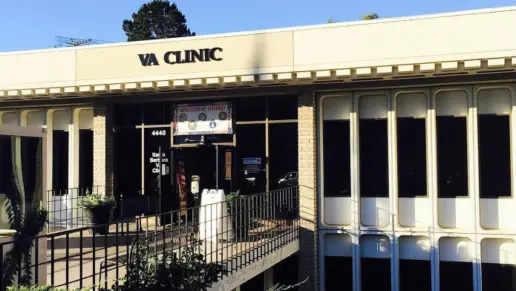About Promises Treatment Centers – Rockcroft Drive
Located in Malibu, California, Promises Treatment Centers offers alcohol and drug rehab services. Their levels of care include detox, inpatient treatment, partial hospitalization, intensive outpatient, and outpatient treatment.
Promises Treatment Centers offers a continuum of care to meet each person where they are at. Services include:
Detox
This program is a medically monitored detox program provided in a clinical setting. Staff focuses on helping clients mitigate discomfort and providing a safe and effective detox.
Inpatient
This program offers 24/7 monitoring and individual therapy, group therapy, and if appropriate, family therapy. Educational classes are provided on a wide variety of topics related to addiction and recovery.
Partial Hospitalization
This is a highly structured program that allows clients to return home in the evening while still receiving treatment during the day. Clients attend treatment five days a week and spend several hours each day in therapeutic activity or meeting with their counselor.
Intensive Outpatient
This program requires clients to participate in treatment for three hours a day. Therapeutic activities, along with counseling and group therapy are provided.
Outpatient
Clients meet with their counselor or participate in group therapy or family therapy one day a week on average. Aftercare programming such as 12 Step programming, SMART recovery, or other self-help groups are considered outpatient treatment. The focus is on maintaining recovery and building a strong network of support.
Latest Reviews
Rehab Score
Accepted Insurance
Other Forms of Payment
Private insurance refers to any kind of healthcare coverage that isn't from the state or federal government. This includes individual and family plans offered by an employer or purchased from the Insurance Marketplace. Every plan will have different requirements and out of pocket costs so be sure to get the full details before you start treatment.
Self-pay involves paying for treatment out of your own pocket. You can use savings or credit, get a personal loan, or receive help from family and friends to fund your treatment. If you don't have insurance or your insurance plan doesn't cover a specific program, self-pay can help ensure you still get the care you need.
Financial aid can take many forms. Centers may have grants or scholarships available to clients who meet eligibility requirements. Programs that receive SAMHSA grants may have financial aid available for those who need treatment as well. Grants and scholarships can help you pai for treatment without having to repay.
Addiction Treatments
Levels of Care
Treatments
The goal of treatment for alcoholism is abstinence. Those with poor social support, poor motivation, or psychiatric disorders tend to relapse within a few years of treatment. For these people, success is measured by longer periods of abstinence, reduced use of alcohol, better health, and improved social functioning. Recovery and Maintenance are usually based on 12 step programs and AA meetings.
Drug rehab in California teaches participants constructive ways to stay clean and sober. Treatment revolves around helping individuals stop using the substance they are addicted to and learn healthy habits to avoid relapse.
Many of those suffering from addiction also suffer from mental or emotional illnesses like schizophrenia, bipolar disorder, depression, or anxiety disorders. Rehab and other substance abuse facilities treating those with a dual diagnosis or co-occurring disorder administer psychiatric treatment to address the person's mental health issue in addition to drug and alcohol rehabilitation.
A combined mental health and substance abuse rehab has the staff and resources available to handle individuals with both mental health and substance abuse issues. It can be challenging to determine where a specific symptom stems from (a mental health issue or an issue related to substance abuse), so mental health and substance abuse professionals are helpful in detangling symptoms and keeping treatment on track.
Opioid rehabs specialize in supporting those recovering from opioid addiction. They treat those suffering from addiction to illegal opioids like heroin, as well as prescription drugs like oxycodone. These centers typically combine both physical as well as mental and emotional support to help stop addiction. Physical support often includes medical detox and subsequent medical support (including medication), and mental support includes in-depth therapy to address the underlying causes of addiction.
Programs



Clinical Services
Cognitive-Behavioral Therapy (CBT) teaches people to recognize moods, thoughts and situations that cause drug cravings and other addictive behavior. A therapist trained in cognitive-behavioral therapy techniques helps a person avoid these triggers and replace negative thoughts and feelings with healthier ones. Since the skills learned using cognitive-behavioral therapy can last a lifetime, CBT is a powerful, evidence-based treatment for drug abuse. A 2011 study found that CBT, either alone or as an adjunct to medication, is an effective technique in the prevention of relapse. Another study found that CBT is helpful in treating bulimia. Other research shows that group and individual CBT are associated with significant and clinically meaningful reductions in adolescent substance use.
Whether a marriage or other committed relationship, an intimate partnership is one of the most important aspects of a person's life. Drug and alcohol addiction affects both members of a couple in deep and meaningful ways, as does rehab and recovery. Couples therapy and other couples-focused treatment programs are significant parts of exploring triggers of addiction, as well as learning how to build healthy patterns to support ongoing sobriety.
Creative expression through art therapy is not only relaxing but helps clients connect with their inner selves through the inspiration of images and their physical manifestation in artistic expression. Art therapy helps restore physical, mental and emotional well-being. Some clients in rehab who have difficulty communicating verbally may be able to use art therapy to express themselves. This type of therapy can help in resolving issues, identifying and managing feelings and behaviors, and improving awareness and self-esteem. Research has found that art therapy can be a beneficial treatment for psychiatric disorders.
Dialectical behavior therapy (DBT), originally developed by Marsha M. Linehan, PhD, teaches people the skills to cope with stress, control emotions and improve relationships with others. DBT has proven effective in adults and adolescents with a range of psychiatric conditions and behavioral problems. Initially developed for individuals with borderline personality disorder (BPD), DBT has been adapted to several other populations with promising results. One study showed participants improve in seven of nine variables analyzed, including anxiety, depression, global psychopathology, interpersonal functioning, self-mutilation and social adjustment. Research on psychological therapies for people with BPD showed that dialectical behavioral therapy has been studied most intensively and demonstrates “statistically significant superiority” over client-centered therapy.
Equine therapy gives clients direct, regular contact with horses, which provides physical, emotional, and mental rewards. Equine therapy can decrease hostility and feelings of anger, lower stress levels, increase trust, improve self-esteem, and provide a greater sense of patience. When a horse is paired with a troubled person, a bond gradually develops between them. Horses are extremely sensitive to the feelings and emotions of humans—they will take whatever emotions or feelings that they are receiving from a human and reflect them back to the person. Once a connection has been established between animal and human, positive change is quickly promoted within the individual.
Experiential therapy is a form of therapy in which clients are encouraged to surface and work through subconscious issues by engaging in real-time experiences. Experiential therapy departs from traditional talk therapy by involving the body, and having clients engage in activities, movements, and physical and emotional expression. This can involve role-play or using props (which can include other people). Experiential therapy can help people process trauma, memories, and emotion quickly, deeply, and in a lasting fashion, leading to substantial and impactful healing.
EMDR is a therapeutic modality originally developed to help process trauma. In an EMDR session, a patient is prompted to undergo eye movements that mimic those of REM sleep. This is accomplished by watching a therapist's finger move back and forth across, or following a bar of light. The goal is repetitive sets of eye movements that help the brain reprocess memory, which can significantly reduce the intensity of remembered traumatic incidents. Associated memories can heal simultaneously, leaving patients significantly calmer, more stable, and more emotionally relaxed.
Family therapy is a type of psychotherapy that is designed to help family members improve communication and resolve their conflicts. Typically this therapy is performed by a licensed therapist, clinical social worker or a psychologist. Since addiction is a family disease, it is important for other members of the family to receive treatment so that they can deal with specific issues relating to the family member’s substance abuse, mental illness or other problems. At Promises, they have found that about 90 percent of family members want to be involved in the treatment of their loved one. Their family therapy program is designed to help family members gain awareness and understanding, so that they can learn how to best support their loved one and themselves. Family therapy may include all or only some family members. The specific treatment plan depends on family needs. They employ two full-time family therapists who meet individually with their client to work on individual family issues and also provide education and support for the client’s significant others.
Alcohol and drug addiction leads to isolation. Reconnecting addicted individuals to a group or community can help address several important recovery-related issues. In fact, clinical studies show that group therapy sessions can be equally as effective as individual therapy in promoting long-term addiction recovery. Group therapy modalities include support groups, psychoeducational groups, skills development groups, and cognitive behavioral groups, among others.
In individual therapy, a patient meets one-on-one with a trained psychologist or counselor. Therapy is a pivotal part of effective substance abuse treatment, as it often covers root causes of addiction, including challenges faced by the patient in their social, family, and work/school life.
Promises Treatment Centers allow clients to have access to newspapers and magazines, listen to the radio, call loved ones, and watch TV at appropriate times, with supervision. By utilizing a real-world perspective, Promises prepares clients for day-to-day life, such as driving past a liquor store or reading an advertisement for an alcoholic beverage. The key is that Promises teaches clients how to process feelings that may arise while exposed to these situations.
A balanced diet is essential to lasting recovery. Most clients are malnourished at the time of their admittance to Promises, so it is important to restore them to physical health through nutrition. Nutritional counseling helps clients learn how to make healthy food choices, which is important in achieving a healthy lifestyle. Foods that are high in nutrients can help rebuild damaged tissues and organs and improve functioning of the nervous and gastrointestinal systems. Research has also shown that a diet that is rich in protein and the right kind of carbohydrates can reduce cravings for alcohol and drugs. Food also affects our moods, so getting enough folic acid and B vitamins is essential to improving mood. Sugar and caffeine can contribute to mood swings, so it is important for those in recovery to avoid both as much as possible. Clients will learn beneficial information like this through nutritional counseling at Promises.
Trauma therapy addresses traumatic incidents from a client's past that are likely affecting their present-day experience. Trauma is often one of the primary triggers and potential causes of addiction, and can stem from child sexual abuse, domestic violence, having a parent with a mental illness, losing one or both parents at a young age, teenage or adult sexual assault, or any number of other factors. The purpose of trauma therapy is to allow a patient to process trauma and move through and past it, with the help of trained and compassionate mental health professionals. If you have experienced trauma or loss, Promises rehab centers offer powerful tools in the treatment of traumatic stress, such as EMDR and somatic therapy.
Amenities
-
Private Setting
-
Yoga Studio
-
Wifi
-
Private Rooms
Accreditations

The Joint Commission, formerly known as JCAHO, is a nonprofit organization that accredits rehab organizations and programs. Founded in 1951, the Joint Commision's mission is to improve the quality of patient care and demonstrating the quality of patient care.
Joint Commission Accreditation: Yes
Accreditation Number: 570115

The Substance Abuse and Mental Health Services Administration (SAMHSA) is a branch of the U.S. Department of Health and Human Services. Established in 1992 by congress, SAMHSA's mission is to reduce the impact of substance abuse and mental illness on American's communities.
SAMHSA Listed: Yes

State Licenses are permits issued by government agencies that allow rehab organizations to conduct business legally within a certain geographical area. Typically, the kind of program a rehab facility offers, along with its physical location, determines which licenses are required to operate legally.
State License: California
License Number: 190625AP
Contact Information
20725 Rockcroft Drive
Malibu, CA 90265



